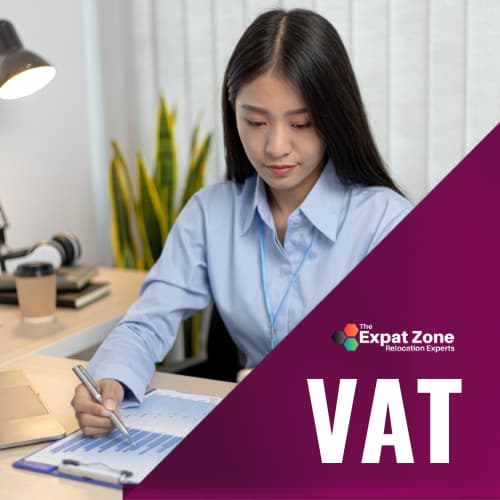Start Your Tax and Financial Consulting
Our tax accounting is the best choice for foreign businesses to make sure they are inline with compliance with tax laws and regulations in Dubai. Expat zone tax record keeping helps your business smartly track financial transactions, claim eligible deductions, and prepare timely and accurate tax returns. Our record keeping also minimizes the risk of errors, penalties, and audits.
Speak to usTable of Contents


What is VAT Registration?
As of recent data, Dubai’s population exceeds 3.3 million residents, comprising a vibrant mix of cultures and nationalities.
The business and family city boasts an economy that is welcoming to expats from the UK, USA, Australia, Philippines, Canada, Europe, with gross domestic product (GDP) surpassing over $110 billion USD annually in 2024, supported by diverse sectors including tourism, real estate, finance, and trade.
The UAE, including Dubai, has been leading the charge in diversifying its economy for its residents for decades, reducing reliance on oil revenue. Non oil sectors contribute significantly to the economy such as Real estate, Digital marketing, Ecommerce, Car rental, Sports, Gyms, Teachers, Online tutors,.
With estimates indicating they account for over 77% of GDP. This diversification has fostered resilience and stability amidst fluctuating oil prices and global economic challenges.
Plus, Dubai’s smart location as a major global transportation and logistics hub bolsters its economic significance.
The city’s world class infrastructure, including the iconic Dubai International Airport and Jebel Ali Port, facilitates international trade and commerce, positioning Dubai as a key player in global trade networks.
Additionally, Dubai’s commitment to innovation and technology is evident through initiatives like Dubai Internet City and Dubai Silicon Oasis, fostering an environment conducive to entrepreneurship and technological advancement.
These efforts have propelled Dubai onto the world stage as a leading destination for business, tourism, and investment.

When should I consider VAT?
Alright, expats, when it comes to VAT registration in Dubai, timing is key.
If your business is raking in AED 375,000 or more in taxable supplies per year, you’re hitting that sweet spot where you gotta start thinking about jumping on the VAT registration train.
But here’s the kicker: even if you haven’t quite hit that threshold yet, if you reckon you’ll be crossing it within the next month or so, it’s best to get ahead of the game and start the registration process pronto.
Why the rush, you ask? Well, VAT registration ain’t something you wanna leave till the last minute. It takes a bit of time to get all your ducks in a row, fill out the paperwork, and get yourself sorted with the authorities.
Plus, you don’t wanna risk getting slapped with fines or penalties for missing the registration deadline.
So, bottom line, if your business is hitting that threshold or you see it coming down the pipeline, don’t dilly-dally. Get on the VAT registration bandwagon and save yourself a world of hassle down the line.
6 Easy Steps for Tax Setup in Dubai
Step 1:
Analyzing the Financial Aspects of your Business
Expat zone kicks off by doing a deep into the financial nitty gritty of your business.
This involves scrutinizing your income, expenses, Visa status, Family Visa, Business visa and the famous Golden visa, assets, and liabilities to get a comprehensive understanding of your financial health.
We assess your financial performance, identify areas of strength and weakness, and pinpoint opportunities for improvement.
Step 4:
Tax Compliance
With our eyes dotted and T’s crossed on the paperwork, it’s time to ensure that your business is fully compliant with tax laws and regulations.
We guide you through the maze of tax compliance requirements, helping you navigate complex tax codes and filing obligations.
From preparing and filing tax returns to meeting deadlines and fulfilling reporting requirements, we’ve got you covered every step of the way.
Step 2:
Tax Planning
Once our tax experts have got a solid grasp of your financial data, it’s time Expat Zone to map out a tax strategy tailored to your business goals.
We work closely with you to develop a tax plan that maximizes tax efficiency, minimizes liabilities, and ensures compliance with relevant regulations.
This involves strategizing on deductions, credits, exemptions, and other tax saving opportunities to optimize your tax position.
Step 5:
Tax Implementations
Now that the groundwork is laid, it’s time to put our tax plan into action. We implement the strategies and recommendations outlined in your tax plan, ensuring seamless integration with your business operations.
Whether it’s adjusting your accounting practices, optimizing your business structure, or leveraging tax incentives, we work tirelessly to execute your tax plan effectively.
Step 3:
Verifying the Documents
Before diving headfirst into tax compliance, we carefully verify all your financial documents to ensure accuracy and completeness.
This step includes scrutinizing your invoices, receipts, bank statements, and other relevant records to ensure they align with regulatory requirements and best practices.
We will leave no stone unturned in ensuring that your financial documentation is in healthy shape.
Step 6:
Review and Support
Our job doesn’t end with implementation – we’re in it for the long haul. We provide ongoing support and guidance, monitoring your tax situation and adapting strategies as needed. We conduct regular reviews to assess the effectiveness of our tax plan, identify emerging opportunities or challenges, and make adjustments accordingly. With our expert guidance and unwavering support, you can rest assured that your business’s tax and financial needs are in good hands.
VAT Return Filing in UAE
Our services such as VAT return filing in the UAE requires businesses to report their taxable transactions to the Federal Tax Authority (FTA), ensuring compliance with VAT regulations.
Your businesses is typically required to file VAT returns on a quarterly basis, with specific deadlines set by the FTA.
Expat zone makes sure accurate reporting is done to avoid fines or penalties from the FTA.
Excise Tax Return Filing in UAE
Expat zone excise tax return filing in the UAE involves reporting on goods subject to excise duties, such as tobacco, sugary drinks, and energy drinks.
If your business is engaged in the production, importation, or sale of excisable goods must file excise tax returns with the FTA.
We make sure timely and accurate filing is provided by us to maintain compliance and avoid penalties in the UAE tax system.
Corporate Tax Return Filing in UAE
Corporate tax return filing in the UAE by Expat Zone requires companies to submit detailed financial information to the relevant authorities, such as the Ministry of Finance or local government entities.
We make sure deadlines for corporate tax return filing are typically aligned with the company’s fiscal year, with penalties imposed for late submission.
Seeking professional assistance from tax consultants such as us at Expat zone or we can dedicate one of our UAE legal experts can help advise on accurate filing and compliance with UAE tax laws.
Expat Zone Services Breakdown
Let us Deal with Monthly and Yearly Tax Returns and Compliance Documents
We at experts for expats meticulously compile and analyze financial data for designated periods, We make sure accurate calculation of taxes owed and deductions applicable.
Our tax experts prepare tax returns and compliance documents in accordance with regulatory requirements, minimizing errors and maximizing benefits for our clients.
We record Files & Documentation for Maintenance
Our tax & accounts team maintains organized and accessible records of all relevant financial documents, including invoices, receipts, and contracts.
Using secure digital systems such as Odoo, TaxAct, TurboTax, TaxCloud.
we ensure easy retrieval and safe storage of documentation, facilitating efficient record keeping and compliance for your business in the UAE.
Let us Follow Updates Regarding the UAE Tax Laws, Regulations, and Practices
We stay abreast of changes in tax legislation, regulations, and practices, keeping our clients informed of any updates that may affect their businesses. By providing proactive guidance and advice, we help clients navigate evolving tax landscapes with confidence and clarity.
We Love Researching Tax and Customs Related Issues
Our accounting experts conduct deep in depth research on complex tax and customs matters, particularly when representing your company.
Expat zone provides insightful recommendations and solutions, clarifying regulatory requirements and resolving disputes with tax authorities.
Expat Zone Interacts with Tax Authority and Customs Teams
We maintain open communication channels with relevant tax authorities and customs teams, addressing inquiries, resolving issues, and ensuring compliance on behalf of our clients. Our experienced professionals represent clients in discussions and negotiations, advocating for fair treatment and favorable outcomes.
We Provide Knowledge Management, Professional Development, and Administrative Activities
We invest in ongoing training and education for our expat team members, ensuring they remain updated on industry trends and best practices.
By actively participating in knowledge management and professional development, we deliver exceptional service and value for you and your clients.
Optimizing Tax and Budget Planning for Long Term:
We collaborate with clients to develop strategic tax plans and financial forecasts aligned with their business objectives.
Our goal is to minimize tax liabilities, maximize savings, and achieve sustainable growth over the long term.
Through careful analysis and proactive planning, we empower clients to navigate complex tax environments with confidence and success.
Business Visa Cost & Breakdown
United Arab Emirates Corporate Taxes and Fees
Value-Added Tax (VAT)
- General VAT rate: 5%
- VAT registration threshold: AED 375,000 (mandatory), AED 187,500 (voluntary)
- VAT exemption for certain goods and services
- Quarterly or monthly VAT returns required
- Penalties for non-compliance
Customs Duties
- Generally 5% on CIF value of imports
- Other rates for specific goods (e.g., alcohol, tobacco)
- Anti-dumping duties on certain goods
- Duty-free imports for GCC member countries and select others
Excise Taxes
- Applicable to tobacco, tobacco products, carbonated drinks, energy drinks, sweetened drinks, electronic smoking devices, and liquids
- Tax rates: 100% (tobacco), 50% (carbonated and sweetened drinks)
Municipal or Property Tax
- Municipality tax on properties based on annual rental value
- Different rates for commercial and residential properties
- Registration fees for property transfers
Social Security Contributions
- Applies to qualifying UAE and GCC national employees
- Rates vary (e.g., 20% for UAE nationals, 26% in Abu Dhabi)
- Employer and employee contributions required
Payroll Taxes
- No personal income tax or payroll tax withholding
Stamp Taxes
- No separate stamp taxes currently levied
DIFC Employee Workplace Savings Scheme (DEWS)
- Replaces End of Service Gratuity Benefit in DIFC
- Monthly contributions required from employers (5.83% or 8.33% of basic salary)
- Aimed at protecting long term employee savings
FAQ: Tax Consultancy in UAE
Q: How can I start tax consultancy in UAE?
- Starting a tax consultancy in the UAE involves several steps. Firstly, ensure you have the necessary qualifications and expertise in tax laws and regulations. Then, establish a business entity and obtain relevant licenses from the authorities. Network with potential clients and build a reputation for providing quality tax consultancy services.
Q: What is the 9% corporate tax in the UAE?
- The UAE does not impose a federal corporate tax on most businesses. However, certain sectors, such as oil and gas and branches of foreign banks, may be subject to corporate tax rates set by individual emirates.
Q: What is Article 33 of the UAE corporate tax law?
- Article 33 of the UAE corporate tax law outlines provisions related to taxation of branches of foreign companies operating in the UAE. It may specify tax rates, exemptions, and reporting requirements for such entities.
Q: What are the tax benefits of Dubai?
- Dubai offers several tax benefits, including no personal income tax, no corporate tax for most businesses, and a low VAT rate of 5%. Additionally, free zones in Dubai provide incentives such as 100% foreign ownership, tax exemptions, and customs duty benefits.
Q: What is a good salary in Dubai?
- A good salary in Dubai varies depending on factors such as job role, industry, and experience. However, salaries in Dubai are generally competitive, with many expatriates enjoying tax-free income and additional benefits such as housing allowances and health insurance.
Q: What is tax free salary in Dubai?
- In Dubai, most salaries are tax free, meaning employees do not pay personal income tax on their earnings. This tax-free income contributes to the attractiveness of working in Dubai for many expatriates.
Q: How much is corporate tax in UAE salary?
- A: The corporate tax rate in the UAE varies depending on the emirate and the type of business activity. While most businesses enjoy tax exemptions, certain sectors may be subject to corporate tax rates set by individual emirates.
Q: Who is exempt from UAE corporate tax?
- Many businesses in the UAE are exempt from corporate tax, including those engaged in sectors such as retail, hospitality, and professional services. However, exemptions may vary based on the emirate and the nature of the business.
Q: What is the highest tax rate in the UAE?
- The UAE does not impose personal income tax on residents, and corporate tax rates are generally low. However, certain sectors or entities may be subject to specific tax rates or regulations set by individual emirates.
